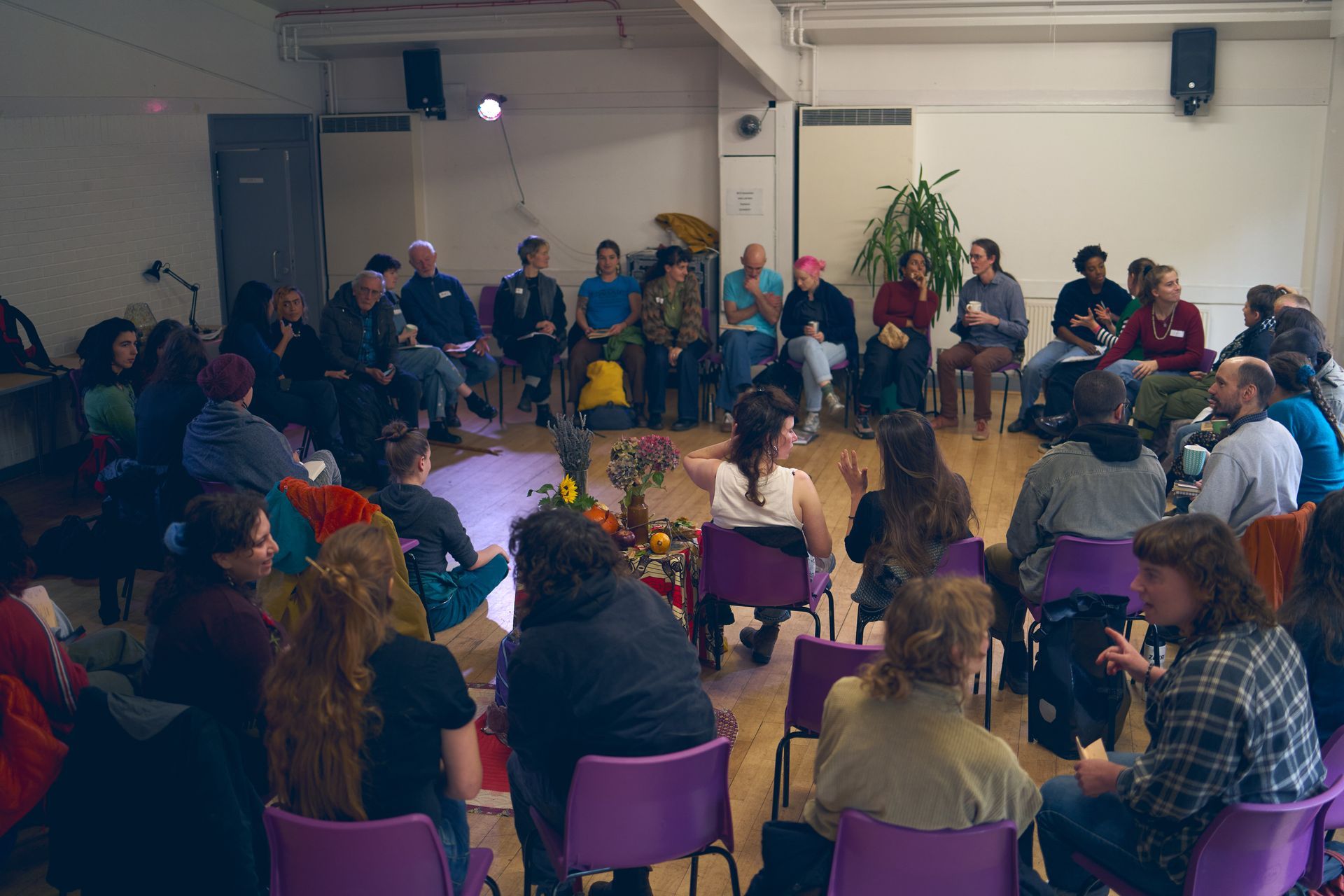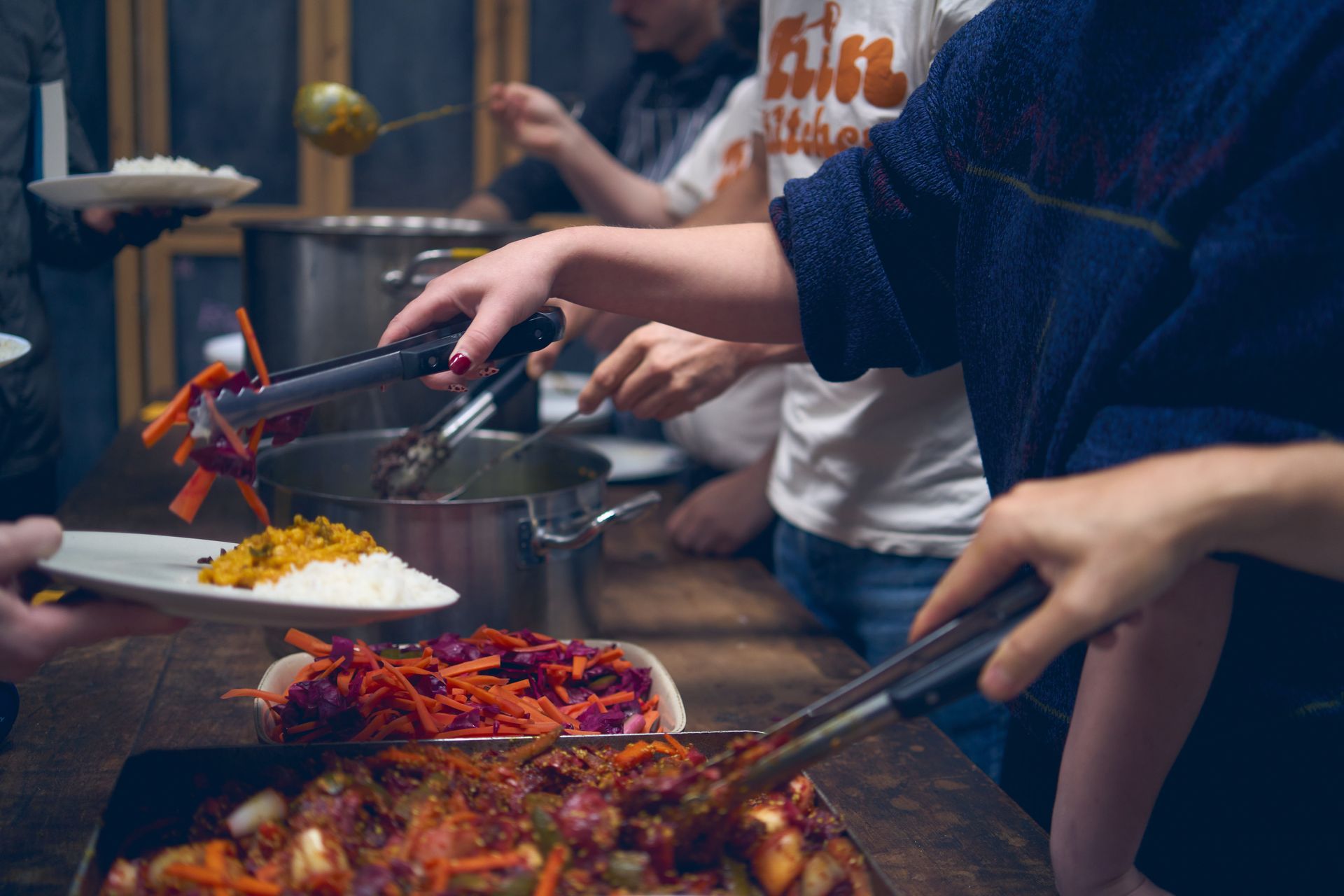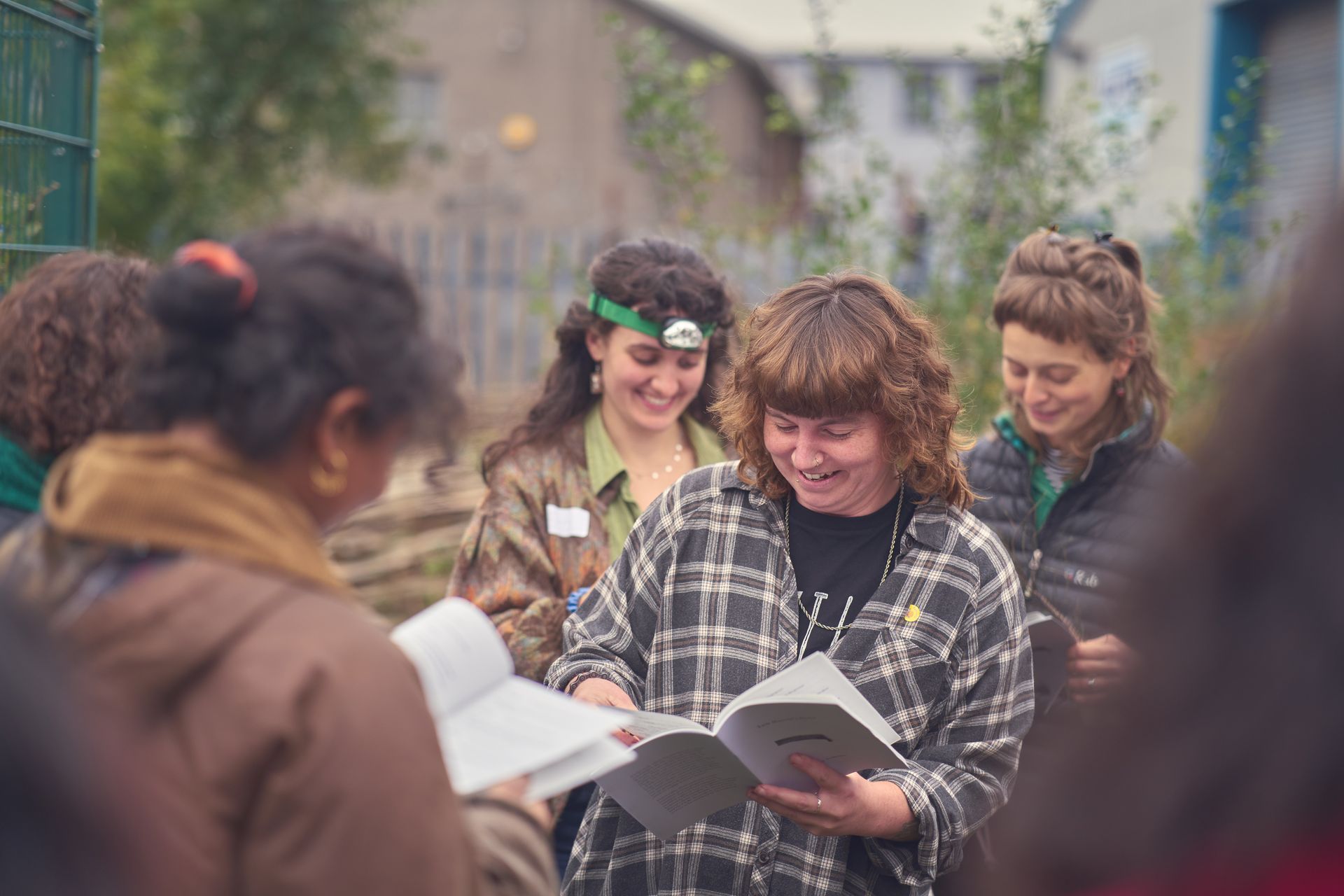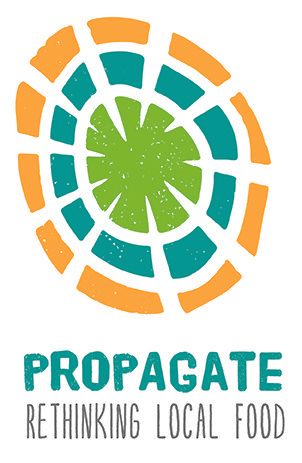A LAND MOOT 2025: A GATHERING FOR LAND JUSTICE
Two Propagate members, Catriona Ferguson and Beth Coleman, report back from a weekend in October

WHAT IS A LAND MOOT?
This October 10th -12th, around 120 of us gathered in Ibrox, Glasgow for a weekend of discussions, food, skill sharing and movement building to explore the intersections of land justice and social justice. This was the second ‘Land Moot’*.
The Land Moot was conceived of as a festival of land resistance, celebrating ways people have fought to protect their land, housing and ways of life, in Scotland and further afield. People from across Scotland organising on issues of - and intersecting with - land justice came together to discuss issues they are currently facing, offering an opportunity to learn from each other and build a movement.
The event was organised by working groups divided across nine key themes;
practical commoning, ecological health justice, housing, collective economies, food, media, resisting green capitalism, internationalism
and political education. All the groups fed into a steering group who brought the whole event together. The aim is the working groups will keep meeting, to make sure the momentum from the event keeps up!
A NEED FOR COLLECTIVE ACTION ON LAND
As both attendees and organisers, two Propagators - Beth and Catriona - wanted to give a summary of our experiences of the Land Moot. To reflect on the intimate connection to land that’s highlighted when working with an organisation engaged in food work and why we left the moot feeling inspired to act, and why it’s necessary.
As community gardeners and food organisers, regenerative farmer's network facilitators and growers - while in an environment of an increasing turn towards fascism and colonial violence - we see that we cannot remove food sovereignty from other struggles for justice**.
There are so many existential threats to our food system, from biodiversity loss and extreme climatic pressures to multinationals’ control over supply chains and crises within agricultural labour markets. Heavy-handed state attempts to tackle some of these issues has resulted in massive surges to the right. For example, the BoerBurgerBeweging (BBB), a right-wing party in the Netherlands made huge inroads in rural communities after a controversial proposal from the government to tax nitrogen pollution which would have disproportionately affected farmers. What we see in the news is yet another farmer protest and tractors in Brussels, but the damaging lasting effects are disillusionment with environmentalism, division in communities and a fertile ground for right-wing populism. We need strong movements to counter this division, none of these issues facing the food system can be tackled by the individual, which is why division and alienation is so dangerous.
Land is integral to food. We couldn’t write about land in Scotland without acknowledging the deeply inequitable concentration of land ownership in Scotland. Half of all privately owned rural land inScotland, or 3.2m hectares (7.9m acres), is held by just 433 people. That said, these figures describing land ownership in Scotland can feel quite abstract and can lead us to overlook some of the intricacies arising in different contexts. It’s important to dig a bit deeper and relate abstract injustices to concrete examples and struggles, both past and present.
Before the Land Moot got underway on Friday, we were both in the kitchen preparing dinner and cooking for the weekend, with veg from
Tyningham Community Farm,
Phantassie Farm and
Garvald Home Farm, all amazing market gardens in the east of Scotland. After the meticulously peeled butternut squash curry and the baking of flapjacks for 150 people it was time for the ceilidh hoose in the Clyde Hall - a moment to share songs, stories and poems.
The Moot opened on Saturday morning with a Mistica - a ceremony often used in Landworkers Alliance gatherings to build on commonalities and a commitment to collective action. We were asked to bring an object from land that means something to us; everything offered was in the center of the room throughout the weekend, as a focal point and constant reminder of this commitment.

WHAT DID WE GET UP TO?
Next up were the first workshops - there were many, and we’ll just talk about the ones we attended, here. Catriona attended a busy session on Ecological Health Justice, looking at how land and health injustices overlap - think healthy soil, healthy bacteria, healthy gut, healthy mind! We also painted some pictures with different soils from across the UK in the Ibrox Commons and discussed how
exactly
we were going to clean up Clyde - imagining cooling dips in the (increasingly) warm summers and creative citizen science projects.
As a member of the Internationalism working group, Beth helped to run a workshop on the importance of an internationalist perspective within a Scotland-based movement for Land Justice. We began by looking at some histories of internationalist organising - from Scots joining the international brigade in the fight against Franco in the Spanish Civil War, to the thriving Scottish anti-apartheid movement for South Africa from the 1960s to the 1990s, and the East Kilbride Rolls Royce factory workers refusing to work on parts for the Chilean airforce during Pinochet’s fascist dictatorship in the 1970s. We do not intend to gloss over Scotland’s role in the slave trade, colonisation, and displacement of peoples from their lands abroad when highlighting these histories - but to show that there is a precedent for action rooted in a sense of solidarity with those across the globe, and to consider the tactics used in these movements.
We discussed current state-sanctioned use of land in Scotland - particularly the creation of carbon credits to facilitate carbon offsetting via the
Woodland or
Peatland code. Two of the top 20 buyers of carbon credits in Scotland are international
arms companies, Babcock and Thales. Does Thales ring a bell? That might be because the Thales’ Govan factory has been the target of several actions by Palestine solidarity activists in recent years - Thales produces the Watchkeeper drone for the UK’s Ministry of Defence through a joint venture with Elbit Systems, an Israeli arms company.
Two speakers, Oluwa Atanda and Karina Emslie then gave two different perspectives from communities that have been subjected to violence from fossil fuel companies and industrial development. Karina spoke about her community work in the
Torry Peoples’ Assembly
and ways local people can make change in their community and beyond. She spoke about the Torry community’s battle to
Save St Fitticks park
from Energy Transition Zone development plans and the importance of understanding the many different ways people’s climate concerns are communicated.
Oluwa addressed the brutality subjected by Shell on the indigenous Ogoni people of Nigeria. Shell extracts huge amounts of oil from the Niger Delta, the land of the Ogoni, and the resulting pollution has horrific impacts on the soils and waters of the Delta, which has gone from being the breadbasket of Nigeria to a place where crops can no longer be grown. He also spoke of the complicity of Shell in the murder of 90 activists who mobilised the Ogoni people in the 1990s. Oluwa told us that the face of these giant oil multinationals is largely hidden to the West - the damages are obscured - and strength to fight against them lies in connecting affected communities to create a
global movement for justice.
On Saturday afternoon we both went to a workshop about popular education to consider different ways we can educate each other about politics and learn about issues involving land.
Davey Anderson, a playwright in Glasgow, wrote a play where everyone was both the cast and the audience. We followed the story of Harvey’s Dyke, set on the banks of the Clyde in the 1820’s where Mr ‘Lang Tam’ Harvey, a local whisky distiller and all round magnate, had taken it upon himself to wall up and privatise a one mile section of the Clyde bank. Those in Bridgeton - weavers, masons and the local poet - were not happy and tore the wall down. The story goes that the demolishers were not charged when the case went to court, and we are now blessed to walk the Cuningar Loop - unobstructed. The play felt like a really exciting shared experience to be part of (we both played parts - Beth as the poet and Catriona as an estate agent) and a great way to spark an animated discussion about land privatisation, what we can do about it, and where it’s happening in Scotland today. It also felt like a more inclusive and broader way of involving people in discussion, and something that could be replicated for many stories across Scotland.

FOOD WORKSHOPS
Food, of course, was a big part of the weekend. Kin Kitchen - a Glasgow-based organisation who use food as a catalyst for community building, knowledge sharing and building food sovereignty in urban settings - kept us all extremely well-fed from Friday evening through ‘til Sunday lunch!
Sunday morning was all about food processing and production skills. The intention of these activities was to have plenty of time for learning and sharing hands-on skills and to encourage a sense of agency over the food we eat and how we can access it. The deer butchery workshop was run by Glasgow Deer Share, a group who get together monthly to butcher and distribute venison, where the hide is tanned and bones used too. Mim, a founder of the
Rhyze Mushrooms Coop, ran a session on mushroom inoculation. Propagators Lusi and Beth led the apple pressing workshop, using equipment from Glasgow Apple Pressing, who provide equipment for community apple pressing in local orchards - though as often happens at community apple pressing, some very capable and enthusiastic learners soon meant it was a collaborative effort. If that wasn’t enough, there was also seed saving with Meg and Hamshya from
Glasgow Seed Library, and miso making using UK-grown carlin peas with Rebecca from
Glasgow Community Food Network.


CLOSING ASSEMBLY AND WORLD CAFE
In the afternoon an assembly was held in Ibrox church, where anyone could offer up proposals or ideas - some were inspired by the weekend and some were campaigns people brought to the Moot. Many ideas were proposed - we’ll mention some, but not all of them here…
There was a proposal for a Clyde clean-up supported by an enactment of
Harvey’s Dyke on the Clyde walkway. A member
Castlemilk Sou’per Heroes called for involvement on a new community plan which would put children first, whilst the owner of a ruined croft-turned-bothy invited folks to come and stay and create a learning centre about the Clearances. The Housing working group’s proposal was for members to join
Living Rent and to contribute to a local place plan. Lochwinnoch Collective Economies, who are collectivising the needs of life - food, shelter, care, education, heat, connection and fulfilment to name a few - made a call out for those interested in joining or setting up new groups where they are, whilst the
Practical Commons working group aimed to create a commoning charter. The
Internationalism working group invited people to research those (companies or individuals) who own large amounts of land in Scotland and abroad with a hope to build an international campaign against this and raising awareness, and the
Media
group proposed a ‘media liberation day’.
Scottish Histories of Resistance called for feedback on their resources, and there was an idea to set up a monitoring and research project to map sites of common struggle, connecting the same land owners repeating abuse on different sites. There was also a proposal for a 2026 Land Moot, and an open call for those who wished to be on the steering group.
These ideas were followed by conversations clustered around each proposal, on the ‘World Cafe’ method - the person who had made a proposal sat at a table, and people could choose which table to gather round, with the freedom to move to another table as they wished. This gave people the opportunity to flesh out ideas, tactics and meet people who were interested to support specific campaigns and projects.

CONCLUSION
To conclude, we had a great time and left the Moot feeling uplifted,
if exhausted from an intense weekend of organising, cooking, dancing, chatting, dreaming and scheming..! We feel resolute in the need for concerted action both to inspire and counter division, and to build a broad and united movement for justice which is rooted in land. Delving into local and internationalist histories gives movements momentum and strength, building them is not just about making connections with people and contemporary struggles, but also looking back to the past and seeing the moment we are in within a wider context and legacy.
Keep up with updates via Scottish Histories of Resistance:
https://www.instagram.com/scottishhistoriesofresistance/
Mailing list
* Moot: A moot hill was a hill or a mound - naturally occuring or purpose built - historically used as a place for assembly, to decide and settle local issues. Proclamations were read and court cases carried out. Doomster Hill in the the parish of Govan was a moot hill, but removed in the early 19th century.
** Food sovereignty “the right of peoples to healthy and culturally-appropriate food produced through ecologically sound and sustainable methods and their right to define their own food and agriculture systems"

All image credits to Graham McGrath.
